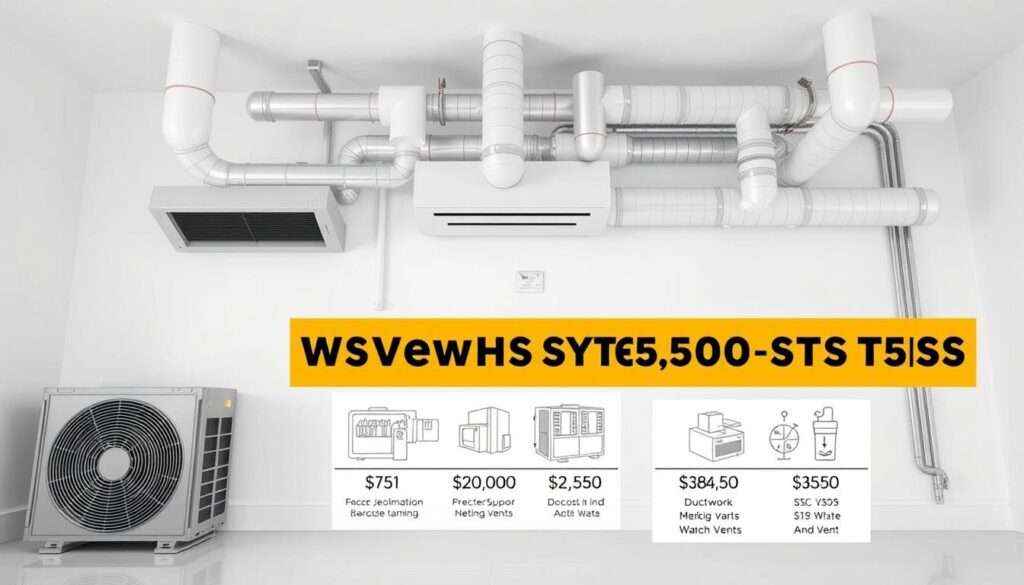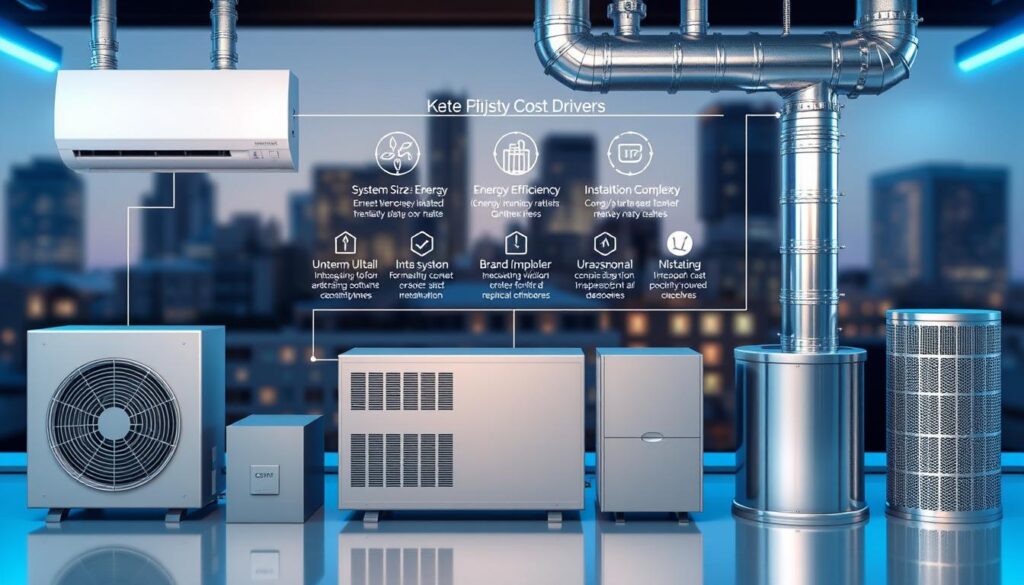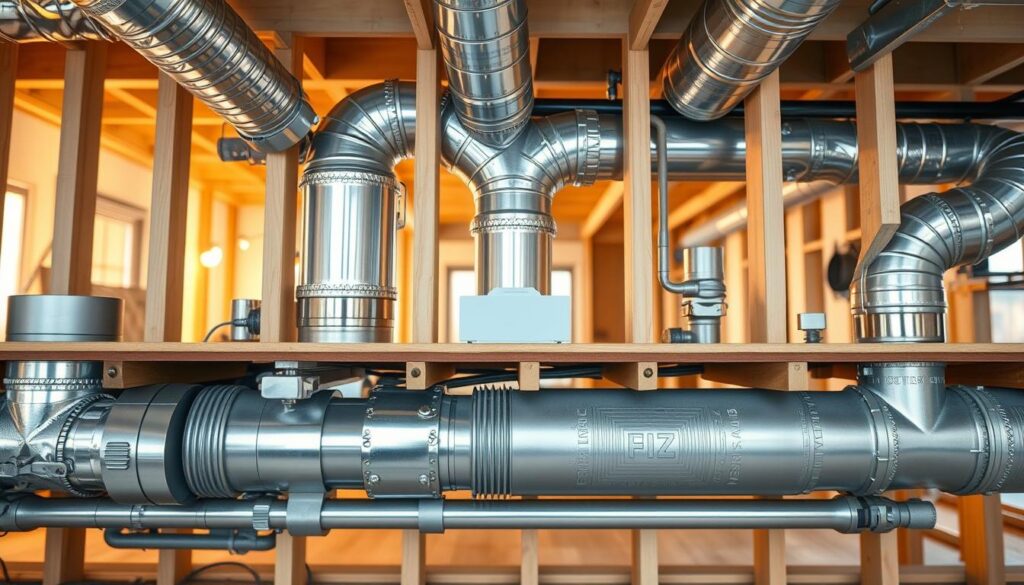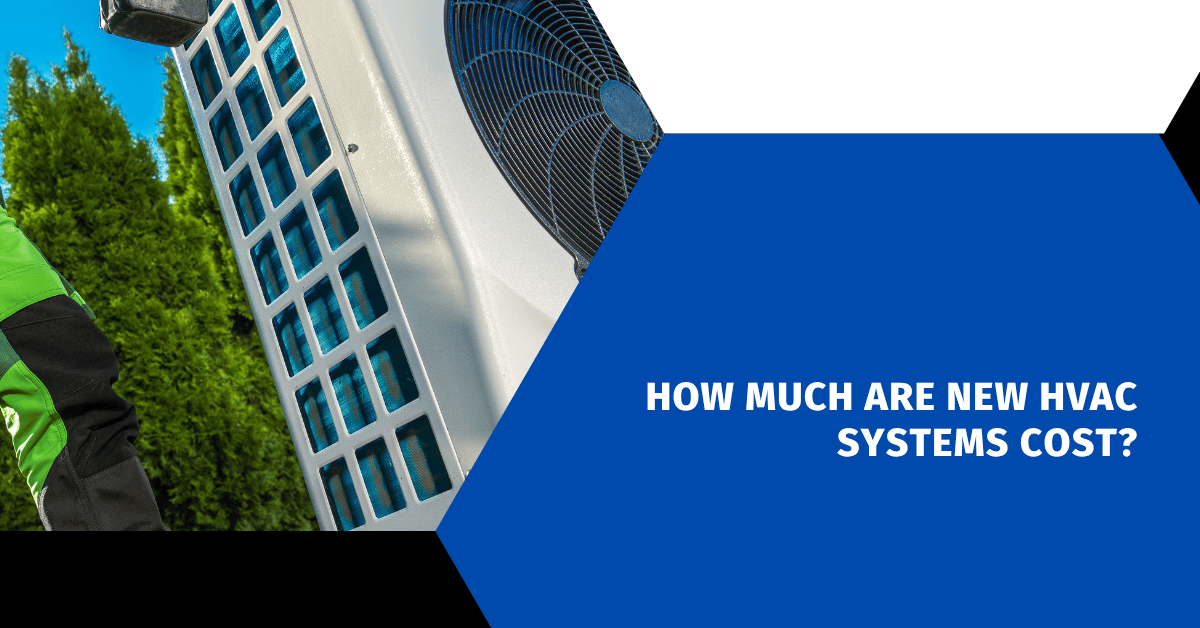Affiliate Disclosure
HVAC Guide Guys is a participant in the Amazon Services LLC Associates Program, an affiliate advertising program designed to provide a means for sites to earn advertising fees by advertising and linking to Amazon.
How Much Are New HVAC Systems Cost? Are you curious about the cost of a new HVAC system? Figuring out hvac installation costs can be tricky. The national average might surprise you.

Homeowners should expect to spend between $5,000 and $12,500 on a new HVAC system. This range shows how different homes have different needs.
Your HVAC system is key to your home’s comfort and energy use. Learning about hvac installation costs helps you choose wisely. It’s about finding the right balance between cost and performance.
Key Takeaways
- Average HVAC system costs range from $5,000 to $12,500
- Prices vary based on home size and system complexity
- Energy efficiency plays a significant role in total investment
- Multiple factors influence overall installation expenses
- Professional assessment is key for accurate pricing
Table of Contents
Understanding HVAC System Basics
HVAC systems keep your home or business at a comfortable temperature. Knowing about residential hvac costs and commercial hvac costs is key. The type and efficiency of your heating and cooling system affect your expenses.
Today’s HVAC systems are complex. They do more than just control temperature. They also improve air quality and comfort.
Core Components of an HVAC System
- Heating unit (furnace or heat pump)
- Cooling unit (air conditioner)
- Ventilation system
- Ductwork
- Thermostat controls
Different HVAC System Types
Each HVAC system has its own benefits for different spaces and costs:
- Central Air Systems: Great for cooling and heating your whole home
- Heat Pumps: Good for places with mild weather
- Ductless Mini-Split Systems: Perfect for controlling temperature in specific areas
- Geothermal Systems: A green option for the long term
Energy Efficiency Ratings
SEER (Seasonal Energy Efficiency Ratio) ratings are important for saving money on hvac costs. Higher SEER ratings mean more efficient systems. This can lead to big savings on energy bills over time.
Pro Tip: A higher efficiency rating might cost more at first. But it can save you a lot of money on hvac costs later on.
Explore Our HVAC Shop
Looking for top-rated HVAC tools, parts, and accessories? Visit our shop and find the perfect solution for your needs.
Visit the ShopAverage HVAC System Costs in 2025
Knowing about hvac unit prices is key for homeowners looking to upgrade in 2025. The market offers various pricing options. This helps you plan your hvac budget well.
Looking at hvac equipment rates, a full system replacement costs between $5,000 and $11,000 on average. This cost varies based on several important factors:
- System type and complexity
- Home square footage
- Energy efficiency ratings
- Local installation costs
Residential HVAC systems in 2025 are getting more advanced. Energy-efficient models might cost more upfront. But, they can save a lot on utility bills in the long run.
| System Type | Average Cost Range | Efficiency Rating |
|---|---|---|
| Split System | $5,000 – $7,500 | 14-16 SEER |
| Ductless Mini-Split | $4,000 – $8,000 | 16-20 SEER |
| Heat Pump System | $6,500 – $11,000 | 17-22 SEER |
When planning your hvac budget, think about more than just the initial cost. Consider energy savings, local climate needs, and how well the system will perform over time.
How Much Are New HVAC
When you’re planning to replace your HVAC, knowing the costs is key. The price of installing a new HVAC system can change a lot. It depends on the type of system, your home’s size, and what you need.
Looking at hvac replacement prices means thinking about different systems and their costs. Let’s look at the main types of HVAC systems:
Basic System Change-out Costs
If you’re on a tight budget, consider a basic single-stage air conditioning system. These are more affordable. They usually cost:
- $4,400 to $8,000 for standard installations
- Good for smaller homes or areas with mild weather
- They cool your home well but cost less upfront
Premium System Installation Prices
For top-notch performance and energy savings, go for high-end HVAC systems. Variable-speed systems are the best for comfort:
- Price range: $8,200 to $13,000
- Advanced temperature and humidity control
- They save a lot of energy over time
Additional Installation Expenses
There are extra costs to consider too:
- Ductwork changes
- Upgrades to your electrical system
- Fees for permits and inspections
- Removing the old equipment
Knowing the cost of new HVAC systems helps you choose wisely. It’s about finding a balance between upfront costs and long-term benefits.
Explore Our HVAC Shop
Looking for top-rated HVAC tools, parts, and accessories? Visit our shop and find the perfect solution for your needs.
Visit the ShopFactors Affecting HVAC Installation Costs

When planning your HVAC costs, many factors come into play. Knowing these can help you choose wisely for your investment.
The cost of an HVAC system is more than just a price. Several important factors affect the total cost:
- Home or building square footage
- Current ductwork condition
- System energy efficiency ratings
- Selected brand and model
- Installation project complexity
Your home’s size and age affect HVAC costs. Older homes might need more ductwork changes, raising costs. Newer homes usually have easier installations.
Commercial HVAC costs vary a lot. They depend on things like special equipment, big spaces, and rules for your industry. Businesses need to think about zoning, ventilation, and custom setups.
Professional HVAC contractors recommend a thorough check to get a good estimate of costs.
Energy efficiency ratings also play a big role. Systems with higher ratings cost more upfront but save money in the long run by using less energy.
By looking at these factors, you can plan a better budget for your HVAC installation. This way, you make a smart choice for your property’s comfort and efficiency.
Size and Home Requirements
Choosing the right HVAC system is all about understanding your home. The size of your HVAC unit affects its performance and cost. It’s important to know how different factors influence the best choice for your home.
Square Footage Matters
The size of your home is key in picking the right HVAC system. HVAC experts use a formula to find the right size for your space:
- Small homes (up to 1,000 sq ft): Typically require 1-1.5 ton units
- Medium homes (1,000-1,500 sq ft): Recommend 2-2.5 ton systems
- Large homes (1,500-2,500 sq ft): Need 3-4 ton units
Climate Zone Considerations
Climate zones also play a big role in choosing an HVAC system. The U.S. has different zones, each needing specific heating and cooling systems.
| Climate Zone | Typical HVAC Requirements | Estimated Cost Impact |
|---|---|---|
| Hot Humid Southern Regions | High-efficiency cooling systems | 15-25% higher equipment costs |
| Cold Northern Regions | Robust heating capabilities | 20-30% increased system pricing |
| Moderate Temperate Zones | Balanced heating/cooling | Standard pricing |
Home Construction Influences
Your home’s build affects the HVAC system you need. Things like insulation, windows, and design can change how well the system works.
Getting a professional’s opinion is key to picking the right HVAC for your home.
Ductwork Considerations and Costs

Ductwork is key to your heating and cooling system costs. Knowing about ductwork costs helps you plan your home comfort upgrade budget better.
The cost of ductwork installation varies from $10 to $20 per linear foot. For a typical home, this means costs between $1,500 and $5,000. Several factors affect these costs:
- Home square footage
- Complexity of duct routing
- Material quality
- Accessibility of installation areas
The state of your current ductwork greatly influences the total cost. Older homes might need a full duct replacement, which can raise costs a lot. HVAC experts usually suggest a detailed duct check to see if repairs or a full replacement are needed.
Duct material also plays a role in costs:
- Flexible ducts: Most affordable, typically $1-$3 per linear foot
- Sheet metal ducts: More durable, ranging $5-$10 per linear foot
- Fiberglass duct board: Moderate pricing, around $4-$6 per linear foot
Always talk to a professional HVAC technician to assess your ductwork needs. They can give you an accurate cost estimate for your home’s specific needs.
Brand Selection and Price Variations
Choosing the right HVAC brand is key to your costs and system performance. Not all systems are the same. Knowing the differences between brands helps you invest wisely.
Looking at hvac equipment rates, you’ll see many manufacturers. Each has its own strengths and prices. You can find everything from affordable to high-end brands, each with its own benefits.
Premium vs Budget Brands
Premium HVAC brands offer:
- Higher energy efficiency
- Advanced technology features
- Longer expected system lifespan
- More sophisticated temperature control
Budget brands are cheaper but meet basic standards. Your choice depends on what you value more: long-term savings or immediate cost.
| Brand Category | Average Cost Range | Expected Lifespan |
|---|---|---|
| Premium Brands | $6,000 – $12,000 | 15-20 years |
| Mid-Range Brands | $4,000 – $7,000 | 12-15 years |
| Budget Brands | $3,000 – $5,000 | 8-12 years |
Warranty Coverage Options
Warranty differences are important for your total cost. Premium brands often provide more coverage, which can make up for the higher initial cost.
- Standard warranties: 5-10 years
- Extended warranties: Up to 20 years
- Registration-based additional coverage
Check each manufacturer’s warranty terms. This will help you see the long-term savings and protection for your HVAC investment.
Explore Our HVAC Shop
Looking for top-rated HVAC tools, parts, and accessories? Visit our shop and find the perfect solution for your needs.
Visit the ShopLabor and Installation Expenses
When you’re planning your hvac installation costs, knowing about labor expenses is key. Labor usually makes up 40-50% of the total cost. This is true for both residential and commercial hvac costs.
Professional HVAC technicians are essential for your installation. They bring the skills needed for your system to work well. Their work ensures your system runs efficiently and reliably for years to come.
- Experienced technicians charge between $75-$150 per hour
- Complex installations require more labor time and expertise
- Local market rates influence overall labor pricing
The complexity of your HVAC installation affects labor costs. Things like home layout, existing ductwork, and system type can make installation harder. Older homes or unique designs might need more detailed installation.
Your location and the local labor market also play a part. Urban areas with higher costs usually have higher HVAC installation rates. Certified and licensed technicians might charge more, but their skills ensure a quality job.
Investing in professional installation is key for your HVAC system’s long-term performance and efficiency.
Always ask for detailed quotes from different HVAC contractors. This helps you understand the labor and installation costs fully. Look at their expertise, warranties, and value, not just the price.
Cost-Saving Strategies for HVAC Installation
To cut down on heating and cooling costs, you need a solid plan. Your HVAC budget plays a big role in the total cost of your home’s comfort system. By using smart strategies, you can lower the cost of your HVAC system and get the most value.
Smart homeowners know that timing and research are key to saving on HVAC installations. By exploring different ways to cut costs, you can manage your budget better.
Optimal Purchase Timing
Choosing the best time to buy your HVAC system can save you a lot of money. Here are some tips for the best timing:
- Install during shoulder seasons (spring and fall)
- Avoid peak demand periods in summer and winter
- Look for off-season promotional deals
Rebates and Financial Incentives
There are many ways to lower your upfront costs with rebates and incentives:
| Incentive Source | Potential Savings |
|---|---|
| Federal Tax Credits | Up to $500 |
| Utility Company Rebates | $100-$800 |
| Energy-Efficient Equipment Programs | 10-30% of system cost |
Look into local and national programs to get the most savings. Energy-efficient models usually get the biggest incentives.
Additional Cost-Reduction Tips
- Get multiple quotes from certified HVAC professionals
- Consider financing options with low-interest rates
- Invest in regular maintenance to extend system life
Pro tip: Always check the specific requirements and documents needed for rebates and tax credits on your HVAC installation.
Explore Our HVAC Shop
Looking for top-rated HVAC tools, parts, and accessories? Visit our shop and find the perfect solution for your needs.
Visit the ShopFinancing Options for HVAC Systems
Getting a new HVAC system can cost a lot for homeowners. Knowing your options can make it easier. There are ways to make the cost of installation more manageable.
Here are your main options for financing a new HVAC system:
- Home Equity Loans: Use your home’s equity with lower interest rates
- Personal Loans: Get quick approval and fixed payments
- Manufacturer Financing Programs: Direct payment plans from HVAC makers
- Credit Card Promotions: Zero-interest periods for certain buyers
Think about your credit score, current finances, and future budget when choosing. Some HVAC companies offer special plans to lower upfront costs. Utility companies might also have programs to help with initial costs.
Pro tip: Always compare multiple financing options to find the most cost-effective solution for your HVAC system investment.
Before you decide on a financing plan, check the total interest, payment terms, and any penalties. Some deals might look good at first but end up costing more over time.
Conclusion
Understanding HVAC system pricing can seem daunting. But with the right information, you can invest with confidence. When looking into new HVAC systems, remember prices usually fall between $5,000 and $12,500. This range depends on several key factors.
Your costs will change based on your home’s size, the system’s efficiency, the brand, and your local climate. Professional HVAC contractors can give you detailed estimates based on your needs. Looking into different options and getting quotes from multiple sources will help you understand pricing better.
Planning carefully can lower your costs. Think about energy efficiency ratings, long-term performance, and rebates. While a high-quality system might cost more upfront, it can save you money on energy and maintenance in the long run.
Always seek professional advice and a thorough assessment of your home’s needs. Knowing the details of HVAC systems will help you make a smart choice. This choice balances the initial cost with long-term comfort and efficiency.
FAQ
What is the average cost of a new HVAC system?
How do I know what size HVAC system I need?
What are the most energy-efficient HVAC system options?
How long does a typical HVAC system last?
Are there financing options available for HVAC installations?
What time of year is best for HVAC installation?
How much do ductwork installations cost?
What is the average cost of a new HVAC system?
How do I know what size HVAC system I need?
What are the most energy-efficient HVAC system options?
How long does a typical HVAC system last?
Are there financing options available for HVAC installations?
What time of year is best for HVAC installation?
How much do ductwork installations cost?
FAQ
What is the average cost of a new HVAC system?
A new HVAC system costs between ,000 and ,000. This price depends on your home’s size, the type of system, and how hard it is to install. Things like your home’s size, the local weather, and how efficient the system is also play a big role.
How do I know what size HVAC system I need?
To find the right HVAC system size, you need a professional to check your home. They’ll look at your home’s size, insulation, and the local weather. They’ll also check how much cooling and heating you need. This helps them pick the best system size for your home.
What are the most energy-efficient HVAC system options?
The most energy-saving HVAC systems are variable-speed heat pumps and high-efficiency air conditioners. Ductless mini-split systems are also good. These systems save more energy and cost less to run over time than older systems.
How long does a typical HVAC system last?
Most HVAC systems last 10 to 15 years with regular care. But, high-quality systems from trusted brands can last up to 20 years. How long it lasts also depends on how much you use it, if you keep it well-maintained, and the local weather.
Are there financing options available for HVAC installations?
Yes, there are many financing options. You can get home equity loans, personal loans, or financing from the system’s maker. Some HVAC companies offer special deals with low or no interest for a while. This can help make the cost of a new system easier to handle.
What time of year is best for HVAC installation?
The best times for installing a new HVAC system are early spring or late fall. At these times, prices are often lower, and you can get quicker service. HVAC companies also offer more deals during these periods because it’s not as busy.
How much do ductwork installations cost?
Installing ductwork costs between
FAQ
What is the average cost of a new HVAC system?
A new HVAC system costs between $5,000 and $12,000. This price depends on your home’s size, the type of system, and how hard it is to install. Things like your home’s size, the local weather, and how efficient the system is also play a big role.
How do I know what size HVAC system I need?
To find the right HVAC system size, you need a professional to check your home. They’ll look at your home’s size, insulation, and the local weather. They’ll also check how much cooling and heating you need. This helps them pick the best system size for your home.
What are the most energy-efficient HVAC system options?
The most energy-saving HVAC systems are variable-speed heat pumps and high-efficiency air conditioners. Ductless mini-split systems are also good. These systems save more energy and cost less to run over time than older systems.
How long does a typical HVAC system last?
Most HVAC systems last 10 to 15 years with regular care. But, high-quality systems from trusted brands can last up to 20 years. How long it lasts also depends on how much you use it, if you keep it well-maintained, and the local weather.
Are there financing options available for HVAC installations?
Yes, there are many financing options. You can get home equity loans, personal loans, or financing from the system’s maker. Some HVAC companies offer special deals with low or no interest for a while. This can help make the cost of a new system easier to handle.
What time of year is best for HVAC installation?
The best times for installing a new HVAC system are early spring or late fall. At these times, prices are often lower, and you can get quicker service. HVAC companies also offer more deals during these periods because it’s not as busy.
How much do ductwork installations cost?
Installing ductwork costs between $1,000 and $5,000. This price depends on your home’s size and how complex the job is. The number of floors, how easy it is to get to the ducts, and if you need to replace or fix parts will also affect the cost.
What rebates or incentives are available for new HVAC systems?
Rebates and incentives vary by where you live. They can include federal tax credits, state programs, and offers from your utility company. These can save you $500 to $2,000, depending on your system’s efficiency and local rules.
Should I choose a premium or budget HVAC brand?
Premium brands usually mean better reliability and longer warranties. But, budget brands can work well and cost less. Think about how much you’ll save on energy, maintenance, and warranty costs. Talking to an HVAC expert can help you choose the best option for your budget.
How do energy efficiency ratings impact HVAC costs?
Higher SEER ratings mean more energy-efficient systems. These systems cost more upfront but save you money on energy bills over time. A system with a SEER rating of 16 or higher can save a lot of money compared to older systems.
,000 and ,000. This price depends on your home’s size and how complex the job is. The number of floors, how easy it is to get to the ducts, and if you need to replace or fix parts will also affect the cost.
What rebates or incentives are available for new HVAC systems?
Rebates and incentives vary by where you live. They can include federal tax credits, state programs, and offers from your utility company. These can save you 0 to ,000, depending on your system’s efficiency and local rules.
Should I choose a premium or budget HVAC brand?
Premium brands usually mean better reliability and longer warranties. But, budget brands can work well and cost less. Think about how much you’ll save on energy, maintenance, and warranty costs. Talking to an HVAC expert can help you choose the best option for your budget.
How do energy efficiency ratings impact HVAC costs?
Higher SEER ratings mean more energy-efficient systems. These systems cost more upfront but save you money on energy bills over time. A system with a SEER rating of 16 or higher can save a lot of money compared to older systems.

